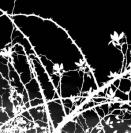Two Books, Two Days
In between working and sleeping, the last two days have been consumed by two delightfully satisfying YA novels, Twisted and The Absolutely True Diary of a Part-Time Indian. These two bildungsromans, written by Laurie Halse Anderson and Sherman Alexie, respectively, follow two very different young men from uncertainty and anger to a choose-your-own-destiny sort of conclusion. I’d been waiting to read these books for months, and neither disappointed.
On probation for vandalizing his school, 17-year-old Tyler Miller returns to school as the nerd he’s always been—but now with a dangerous reputation, which gains him favor from the alpha female of the school, who happens to be his dad’s boss’s daughter. Struggling against a dysfunctional family, suicidal thoughts, and a police investigation thanks to false accusations from his peers, Tyler begins to learn what it means to be a man.
Laurie Halse Anderson delves into her protagonist’s mind, painting a spotless and sometimes troubling portrait of adolescence. She delves into high school, which is never uglier and never more meaningful than when she holds the shovel. She delves into the troubles of a suburban American family, offering hope without succumbing to a happy ending. Five stars for Twisted, easily. (If you decide to read this story, remember that Anderson doesn’t tell pretty or comfortable stories; although she does tell important ones.)
I can’t resist repeating one of the promotional quotes on the back of Twisted, from author Chris Lynch: “Laurie Halse Anderson is the undisputed bard of suburban American high school society.…Reality may bite, but perception just might tear you to shreds. The last line of defense for our hero is the same as it’s always been—character.”
The Absolutely True Diary of a Part-Time Indian: A Synopsis
Junior (Arnold Spirit, Jr., formally), born with many medical issues, grows up on the Spokane Indian Reservation as the brunt of many jokes and fistfights, and as the target of many bullies, including adults. Sick of poverty, inadequate education, and hopelessness, he decides to attend nearby all-white, small-town Reardan High School. The rez community sees Junior’s decision as a betrayal of his home and culture.
Labels: review: book


